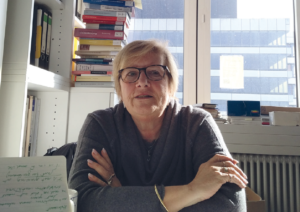FOCUS ON ANTI-SEMITISM Prejudice, a risk for democracy
Historian Juliane Wetzel’s office is on the ninth floor of the Technische Universität, Berlin’s Institute of Technology, in a glass skyscraper overlooking Ernst-Reuter Platz. The room is bright and full of books. Right in front of one of the dangerously leaning stacks of books, Ms. Wetzel tells us about the research she has conducted with the “Zentrum für Antisemitismusforschung”, the Research Centre on Anti-Semitism.
The Centre is the crown jewel of the university and Ms. Wetzel is one of its most respected researchers. For about a decade, she has been part of the independent experts group on anti-Semitism of the Bundestag, Germany’s federal parliament, and since 2015 she has been a board member of the “Kreuzberg Initiative gegen Antisemitismus” (KIgA), the Kreuzberg Initiative against Anti-Semitism. Founded in 2003, it was one of the first initiatives of German civil society that developed methods to tackle anti-Semitism through education in Germany’s increasingly multicultural society. According to Wetzel, upbringing and education are the only tools that can effectively protect society from anti-Semitism and racism of any kind.
“It is crucial to develop educational models, both for school and out-of-school programmes, that is tailored to world of youth. This, no doubt, is the key against anti-Semitism.” Practical, frank and blunt, she is not afraid to say that teachers are part of the problem: “Even though Holocaust education is now a research topic and many of us are working on it, not every teacher keeps up to date, and not all of them are well prepared. We need to reach them, to train them, and sometimes to radically change the way they teach.”
It is hard to analyze what is considered a growth of anti-Semitism in Germany, even though it is not supported by data – nor are the fears of the Jewish community. “According to a recent study, 78% of the members of German communities are afraid of the presence of Muslims. However, the increase in cases of anti-Semitism cannot be linked to the growth of the Islamic community. Almost 90% of anti-Semitic attacks come from the far right, but public opinion blames them on the new immigrants to feel they have a ‘clear conscience’ and avoid facing the problem at the root.”
Wetzel also explains another rarely mentioned, but fundamental aspect that is worth remembering: “Anti-Semitism has nothing to do with real people. It relates to imagined identities and fears, not to reality. It is not even linked to the Shoah anymore; the so-called ‘new anti-Semitism” is much more closely connected with the events in the Middle East.”
Juliane Wetzel is also a delegate of the International Holocaust Remembrance Alliance, the organisation that brings together 31 countries through the Stockholm Declaration in the fight against anti-Semitism. For IHRA she has recently co-edited a book with Steven Katz called Refugee Policies from 1933 until Today: Challenges and Responsibilities. The book was inspired by the many discussions on the ongoing refugee crisis, which persuaded IHRA delegates that they cannot keep silent about the fate of so many fleeing people. It followed a conference held in Rome in February 2017 and co-organised by the Catholic Church. The volume, edited by experts of the history of the Shoah and focusing on legal issues and human rights, is meant to be a consideration of the past that aims to concretely inform today’s politics in a positive, rational and ethically responsible way.
It is addressed to the organisations and governments that are currently being faced with the issue, highlighting which past policies succeeded and which failed. “The past reminds us of what happens when xenophobia, racial hate and anti-Semitism spread out uncontrolled in society and governments succumb to national far-right movements. Hate and prejudice undermine the democratic political order and are fostered by indifference. It was true in the 30s and 40s – and still is today.”
Translated by Federica Alabiso, student at the Advanced School for Interpreters and Translators of Trieste University, intern at the newspaper office of the Union of the Italian Jewish Communities.

